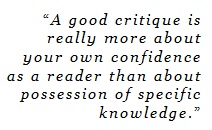Where & Who:
The Subject-specific databases are where scholars gather and chat about their research.
Your calling cards to join the party:
in your syllabus, course reserves, etc.
First Group of Search Words:
*People: an artist, a (literary) writer, an architect, an art historian/critic, a filmmaker/director, authors of books/articles, etc.
*Objects: buildings, works of art, movies, novels, titles of books/articles, etc.
Second Group of Search Words:
*Theoretical approaches /Theme/Genre/Style/Case Studies: post-colonialism, road films, video art, magic realism, Gothic architecture, Museum of Fine Arts, Boston as a case study in discussing a current art museum issue, etc.
*Time/Cultural/Geographical locations, when applicable: medieval Spain, etc.
**A logical combination of any of the above elements to state their connections and contextualize your search. (Simple Tricks; Magic Results)
The Dinner Party Game:
*Use the above search words for your initial searches in the databases.
*You will learn, through search results, scholarly discussions on your potential topic (imagine yourself listening in on the dinner party conversations among scholars in your field.).
*A search simply by names of people or titles focuses on an essential element in a topic, while opens to all possible perspectives and approaches towards a subject. From the breadth of such search results, you have the flexibility in pursuing any narrower focus that interests you.
**The dinner party image is from the Florida Center for Instructional Technology (FCIT) at USF. ( http://etc.usf.edu/clipart.)


